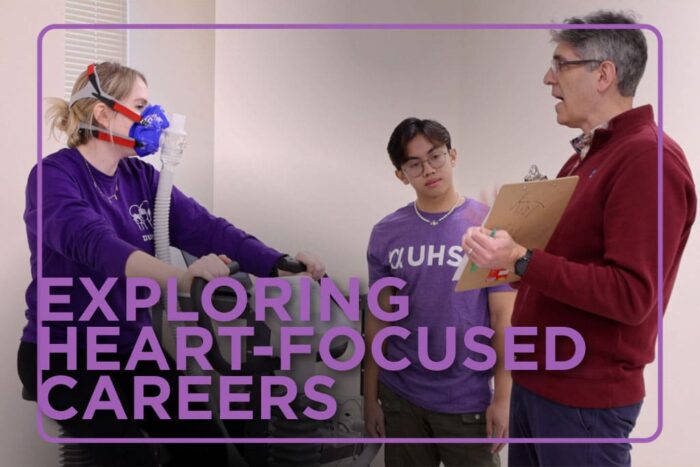
Heart Smarts: Exploring Heart Health Careers
According to the American Heart Association, someone in the United States dies of cardiovascular disease every 34 seconds, making heart health a critical issue for all of us. While this statistic is daunting, it underscores the urgent need for continued research, innovation and patient care in the fight against heart disease. Advancements in medicine, preventative care and treatment options are constantly evolving, offering new hope for those affected by heart conditions and new heart health careers opportunities for those in the field.
Exploring Heart-Focused Careers
As the demand for improved cardiovascular care grows, so do career opportunities in this life-saving field. Whether you’re drawn to patient care, cutting-edge research or the development of innovative treatments, cardiology offers a wide range of professions dedicated to improving heart health. From diagnosing and treating heart conditions to pioneering new medical technologies, professionals in heart health careers play a crucial role in shaping the future of cardiovascular medicine.
Pharmacists in Cardiology 💊
Pharmacists are critical players in the field of cardiology, making a profound impact on heart health through patient education, collaboration with medical teams and expert medication management. By leveraging their expertise, pharmacists working in cardiology help reduce hospital readmissions, improve quality of life for patients and drive innovations in heart health.
Career opportunities in cardiology for pharmacists are diverse and impactful:
- Clinical pharmacists specializing in cardiology work closely with patients and health care teams in hospitals or specialty clinics, ensuring the best possible outcomes through precise medication therapy.
- Academic pharmacists and researchers contribute to advancements in cardiovascular care by leading studies that uncover new treatments and refine best practices.
- Ambulatory Care Pharmacists work in outpatient settings, such as heart failure or anticoagulation clinics, helping patients manage chronic cardiovascular conditions like hypertension, heart failure or atrial fibrillation through medication therapy management and patient education.
- Pharmacogenomics Specialists analyze how genetics influence a patient’s response to cardiovascular medications, helping personalize therapy for better outcomes.
Heart failure is primarily managed by medication, so it’s a great niche for pharmacists to work in within cardiology.
Anastasia Armbruster, Pharm.D. ’09, FACC, BCPS, BCCP, associate professor of pharmacy practice at UHSP
Cardiology Nursing 🫀
Cardiology nurses are essential in delivering personalized care, supporting patients recovering from heart surgery and managing chronic cardiovascular conditions. Combining technical expertise with compassion, they monitor heart health, educate patients on lifestyle changes and ensure continuity of care during critical times. By delivering personalized care and advocating for patients, cardiology nurses make a lasting impact on the lives of those with heart conditions, ensuring that every heartbeat counts.
Career paths in cardiology nursing offer opportunities for both growth and specialization.
- Cardiac nurses provide direct care for patients undergoing procedures like bypass surgery or valve replacement.
- Telemetry nurses focus on monitoring and interpreting heart rhythms for signs of improvement or complications.
- Advanced practice nurses in cardiology take on leadership roles, offering specialized treatments and collaborating with multidisciplinary teams to develop tailored care plans.
Exercise Physiology 🏋️
Exercise physiologists also play a pivotal role in cardiovascular health, using physical activity as a tool for prevention and recovery support. Their expertise helps individuals improve overall heart health, enhance fitness and reduce the risk of future complications.
By combining science with personalized care, exercise physiologists empower individuals to take control of their heart health, making movement a cornerstone of prevention, performance and well-being.
Career paths in this field include:
- Cardiac rehabilitation specialists design and oversee exercise programs tailored to patients recovering from heart conditions.
- Exercise physiologists focus on long-term health strategies to optimize performance and promote lifelong wellness.
A degree in exercise physiology gives students the tools to make a real impact—whether it’s helping individuals reach their peak performance, supporting rehabilitation efforts as part of a care team or promoting lifelong health and wellness. It’s a career path rooted in both science and service.
Keith DeRuisseau, Ph.D., exercise physiology program director and associate professor at UHSP
By delivering personalized care and advocating for patients, cardiology nurses make a lasting impact on the lives of those with heart conditions, ensuring that every heartbeat counts.
Physician Assistants 🩺
Physician assistants (PAs) in cardiology play a critical role in diagnosing and managing cardiovascular diseases, working closely with patients to deliver life-changing care. By combining clinical expertise with a patient-focused approach, PAs in cardiology help advance heart health and improve quality of life for those with cardiovascular conditions.
Career paths for PAs in cardiology are both diverse and impactful, including roles in:
- General cardiology PAs manage chronic conditions such as hypertension, coronary artery disease and heart failure through patient assessments, medication adjustments and lifestyle counseling.
- Procedural PA specialists assist with interventional cardiology procedures such as cardiac catheterization, pacemaker insertions and electrophysiology studies, helping to diagnose and treat complex cardiovascular issues.
For students interested in this field, educational pathways such as a pre-physician assistant program provide a strong foundation in coursework essential for PA school, including anatomy, physiology and medical sciences. These preparatory programs help aspiring PAs gain the knowledge and experience needed to pursue a rewarding career in cardiology.
PUblic Health CAreers😷
Public health professionals work to prevent heart disease through education, advocacy and policy, reducing risk factors like hypertension, obesity and smoking while improving access to care.
Career paths include:
- Cardiovascular epidemiologists analyze disease trends.
- Health policy advisors advocate for better heart health policies. Pharmacists specializing in cardiovascular health policy help shape medication guidelines and expand access to life-saving treatments.
Public health plays a critical role in cardiovascular disease prevention. Educators and advocates coordinate health fairs, school presentations and community outreach to raise awareness, promote wellness visits and encourage heart-healthy habits like proper nutrition, exercise and stress management. These efforts improve health outcomes and save millions in health care costs.
Jennifer Kelton-Huff, Ph.D., CPH, assistant professor of public health at UHSP
Choose Your Career Path with Heart
Because heart disease is the leading cause of death in the U.S., heart health careers offer students pursuing health care professions a chance to make a meaningful difference in improving the health and well-being of communities nationwide. If you’re inspired to explore a path in health care, learn more about how UHSP’s academic programs can help you take the first step toward a fulfilling career.


